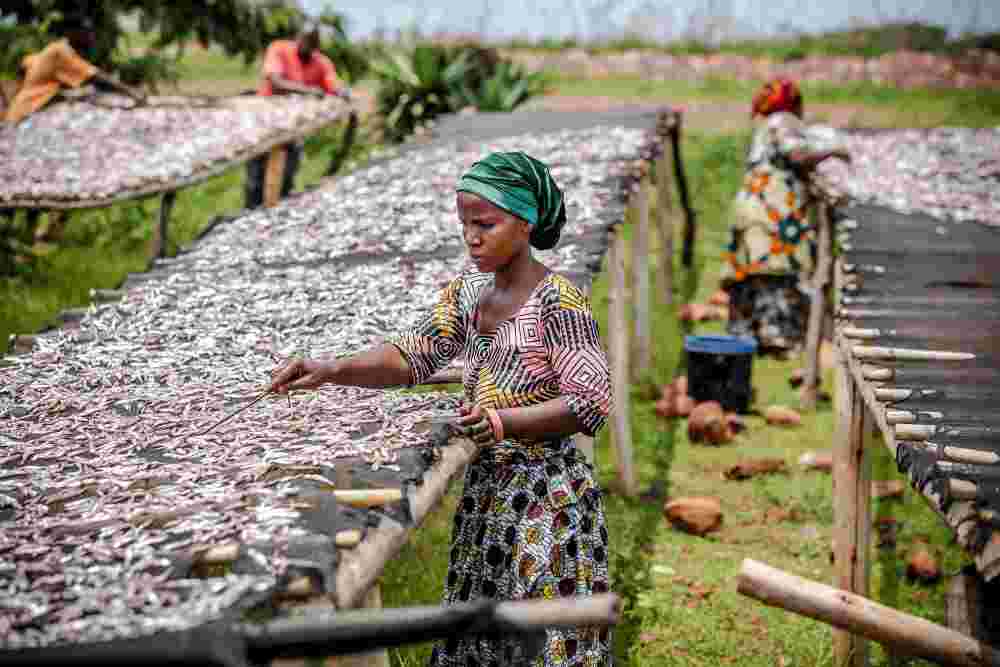Empowering Women in Small-Scale Fisheries for Sustainable Food Systems
Namibia, 2022
Get Microdata
Reference ID
NAM_2022_EWSFSFS_v01_EN_M_v01_A_OCS
Producer(s)
Molly Ahern
Collections
Metadata
Created on
Dec 01, 2023
Last modified
Dec 01, 2023
Page views
35807
Downloads
329
- Data files
- data_anon_ind
- data_anon_FGD
- data_anon_KII
Why is the proportion of SSF who farm fish like that? Explain (V12)
Data file: data_anon_KII
Overview
Valid:
26
Type:
Discrete
Width:
255
Range:
-
Format:
character
Questions and instructions
Categories
| Value | Category | Cases | |
|---|---|---|---|
| Access to land and startup capital | 1 |
3.8%
|
|
| Aquaculture still in promotional state Constrains such as environmental and strategic | 1 |
3.8%
|
|
| Fish farming is a new practice in the country therefore require more awareness. More support and funding on fish farmers is needed. Retarded growth rates, this may require proper scientific research on which species to grow under farming condition. | 1 |
3.8%
|
|
| It is Expensive to farm fish in the area and weather conditions are not suitable Lack of knowledge of farming fish. | 1 |
3.8%
|
|
| It's very difficult | 1 |
3.8%
|
|
| Lack of capital and expertise on fish culture. | 1 |
3.8%
|
|
| Lack of enough water, lack of farming equipments, lack of funds to set up an aquaculture establishment. | 1 |
3.8%
|
|
| Lack of fish farming information Fish farming facilities are very expensive Most areas are floodplain which makes it difficult for fish farming | 1 |
3.8%
|
|
| Lack of knowledge and advocacy on aquaculture, high number of fish in the rivers, high input cost, less interest from the people in aquaculture, the respondent believes there's no success from previous aquaculture projects. | 1 |
3.8%
|
|
| Lack of knowledge and information required to setup a aquaculture farms | 1 |
3.8%
|
|
| Lack of knowledge, capital and adequate water sources needed to fish culture. | 1 |
3.8%
|
|
| Lack of support and starting capital Lack of funding Lack of support | 1 |
3.8%
|
|
| Limited water supply Lack of interest because most tribes like meat over fish No and lack of knowledge and awareness on aquaculture and it's benefits | 1 |
3.8%
|
|
| Most people at coastal areas don't farm fish because fish are readily available in the sea, they either go fishing or buy fish from the market. The only farming activity that am aware of in Walvis Bay is mariculture mostly oysters farming. | 1 |
3.8%
|
|
| New innovations that people don't have much knowledge about | 1 |
3.8%
|
|
| No capacity building provided to local people, government takes long time to distribute fingerings, once you put in an order, people prefer other agricultural activities such as crops and livestock rearing. Fish farming need more start up capital, espec | 1 |
3.8%
|
|
| No fish farming activities are taking place in the area | 1 |
3.8%
|
|
| People become more aware of benefits of eating fish and now prefer healthier options | 1 |
3.8%
|
|
| People do not have capitals to start up their own farms | 1 |
3.8%
|
|
| People do not have start up capital | 1 |
3.8%
|
|
| People only use big companies, local shops and fisherman to buy fish also it cost a lot to maintain fish farm and the is no incentives from government to promote fish farming around the area since we have fish in the ocean. | 1 |
3.8%
|
|
| The climatic conditions are not suitable for farming and it is very expensive to farm marine fish. | 1 |
3.8%
|
|
| There are no proper water bodies, on the other hand some people leave in areas where the soil only hold water during rainy season and some people do not have money to start farming fish | 1 |
3.8%
|
|
| There are some challenges involved in fishing farming | 1 |
3.8%
|
|
| They do not have start up capital | 1 |
3.8%
|
|
| They don't have the knowledge, skills and finance to start up a fish farm | 1 |
3.8%
|
Warning: these figures indicate the number of cases found in the data file. They cannot be interpreted as summary statistics of the population of interest.
